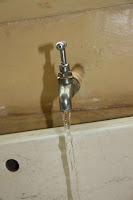Today is Sunday, August 7th. Tomorrow is my last day in the hospital. Tuesday I take a bus for the 6 hour trip to Nairobi and board the plane that evening. After nearly 24 hours of flying and layovers, I'll be back in Gulfport Wednesday night.
The water project has been a qualified success. Hampered by my inability to access money I left in my bank accounts in the states, we still accomplished almost everything. We cleaned the 10,000 liter cistern which will collect rain water. We installed the pump to move that water to an elevated water tank, on a concrete tower we built. We paid for an electrician to hook up power to the pump. We reworked all the plumbing from the tank to the wards, the lab, the pharmacy, the doctors offices, the dentist office, the kitchen, the laundry, the out-patient department, maternity, family planning clinic, and the wards. We replaced the tanks on 5 toilets and all the plumbing associated with twelve sinks. From the cistern on, the project is basically completed and running. The only part of the project not completed is one of the most important, the gutters to collect the rain water. Keumbu is one of the rainiest areas in Kenya (not to worry, those of you who had heard there was a drought in famine in parts of Kenya, that part of the country is far away). The gutters that had been in place since the hospital was built 12 years ago were basically rusted away. We're going to replace these with PVC pipes. This part of the project will be completed when I return to the states from which I'll transfer $1500 by Western Union. So, I'm proud for what we've done.
I say "We" repeatedly above, for, of course, a project like this is a group effort. Local electricians, water engineers, plumbers, hospital officers, and workmen did the work. Mississippi (and one Colorado) benefactors gave money to make this possible, especially the Edgewater Rotarians. Thank you!
Traveling to a foreign country is always a broadening experience, and to Africa a dramatically awakening perspective. Though Swahili is the official language, Kenya was a British colony for the first half of the 20th century, and with English being so important in International business, all but the uneducated speak adequate English, albeit with a strong African accent. The soft "I" in Swahili is pronounced "EE", that is, like a strong E. So "It is good," sounds like "Eet ees guut."
They can't distinguish between "r" and "l" sounds, and the hard "G" and hard "C" sound like K. "Th" is soft, so when I ask about clothes they think I'm asking about gloves. Still, communication is good, though my Swahili remains quite weak. I can make do in a store or a restaurant, but not casual conversation. "Ne me sheba," means "I am full."
Speaking of restaurants, there aren't many. Kisii Town has a population of 200,000 people, about the population of Biloxi, Gulfport, Long Beach, and Pass Christian combined, and, of course, many, many more in the surrounding countryside. However, there are no fast food places, no chain restaurants, and hardly any choices. Restaurants that exist typically have a three or four page menu, with offerings in Indian, Pizza, Chinese, and typical African dishes, including selections in Beef, Goat, Chicken, and Fish. However, no matter what you order, they always only have chicken or fish. Fish can be ordered stewed, boiled, steamed, or fried, but no matter how you order it, it always comes out the same, baked. It's eaten with the fingers, carefully pulling the meat off the bones, of which there are many, as the fish is always tapilia. It's served with stewed greens (Mississippians would love it) and coleslaw, plus your choice of ugali (a maize meal mix), French fries (known as chips), roast or mashed potatoes, though they never have the roast or mashed potatoes. The typical cost is about $4.00, though drinks are extra, a bottle of water 50 cents, coca-cola 80 cents, and Tusker beer (the 16 oz) $1.40. At night you won't be able to talk because of blasting beat music (mostly American songs, with some Swahili songs intermittent) and International Soccer games showing on various screens. Africans love to dance; alone, in a couple of same or mixed sex, or in groups. They'll eat a bit, stand up and dance, and sit down to eat and drink some more. Alcohol is lightly consumed, and service is VERY slow. You can give the waiter a 500 Ksh note for your 350 bill, and maybe an hour later he'll bring the change. He won't forget, he just doesn't think there's a hurry. And one almost never tips unless the service was extremely good, then a 100 Ksh ($1) is generous.
Besides the hospital work, I also had three vacations this trip. I spent the first few days on the beach in Mombasa, took a weekend trip to Nakuru Park, with all the flamingos, and this weekend to the national wildlife sanctuary Masai Mara. I thought I'd report more on these trips on this blog, but this will have to wait until I have been email access. So once I'm back in the states I'll get the photos together and post on Facebook and send more detailed blogs. Let it suffice to say it's amazing to be in a tiny van a few meters away from giraffes, water buffalo, and lions. The wildebeest are on their annual migration from Tanzania, two million crossing the Serengeti!
This will be my final post from Africa. More when I'm home! Thanks for following.
Philip
